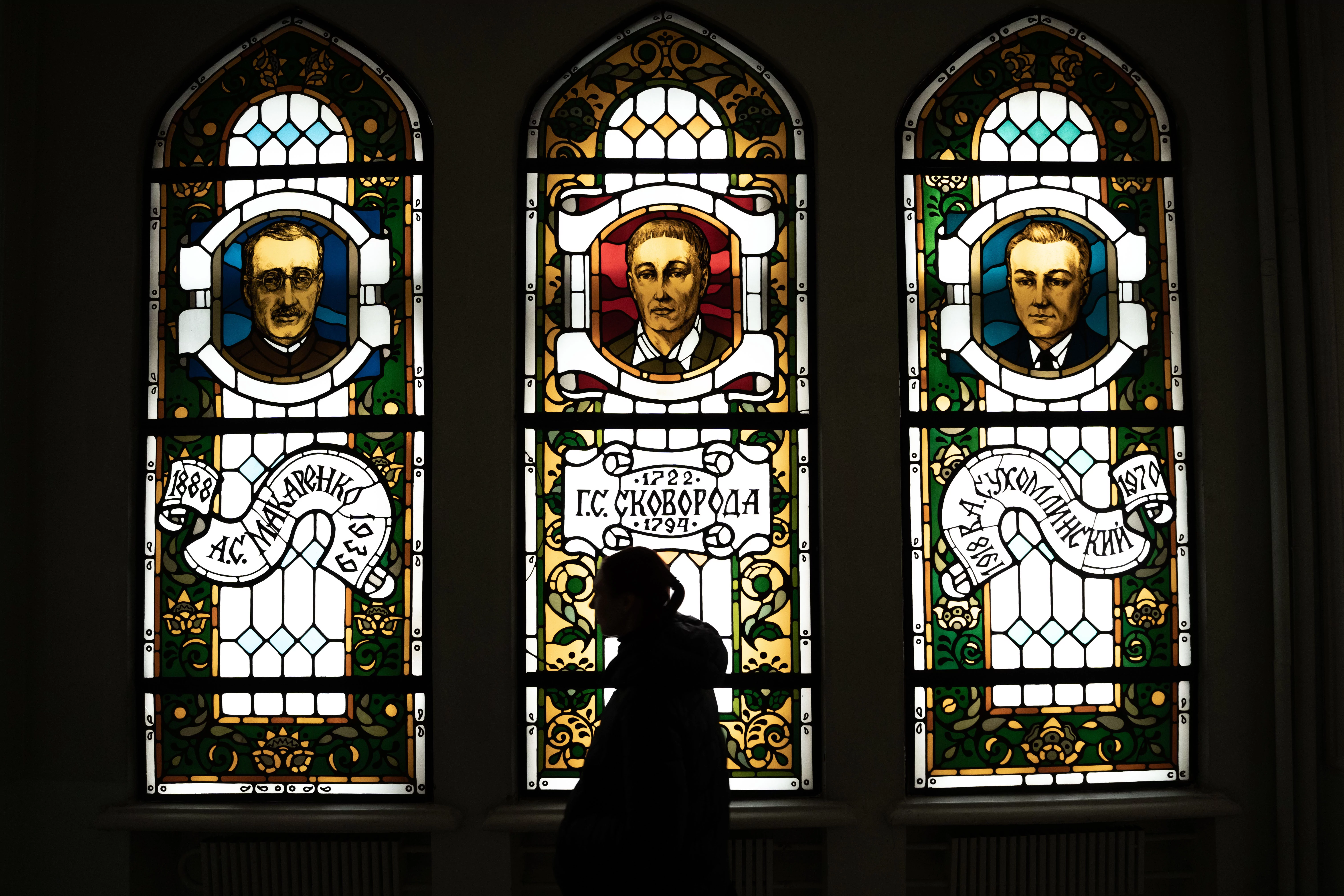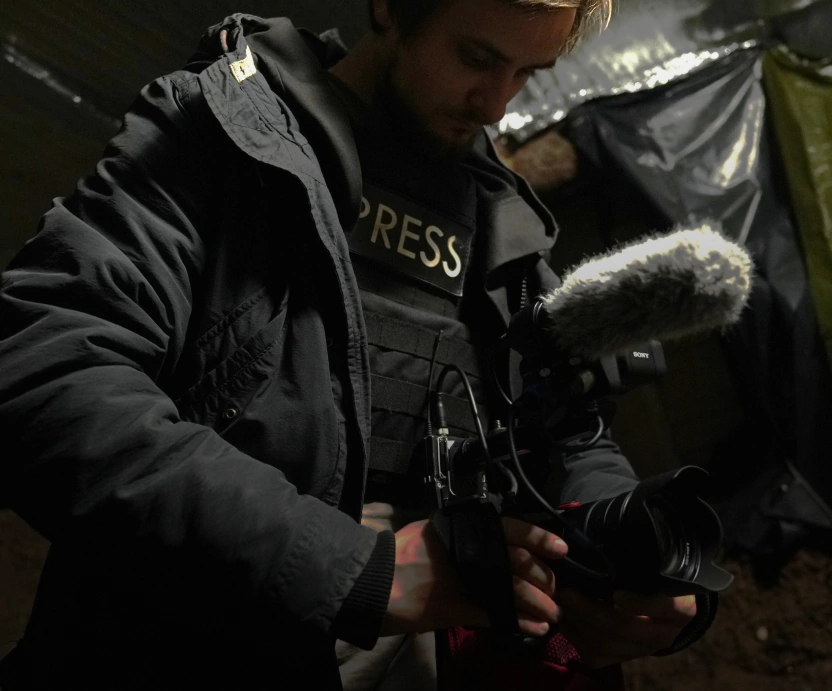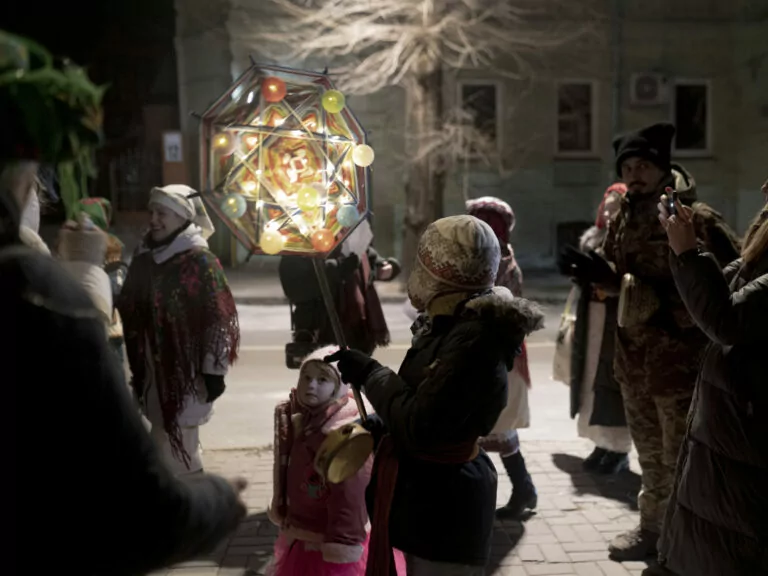H.S. Skovoroda Kharkiv National Pedagogical University became the second in Kharkiv to introduce a language ombudsman. The first was Karazin University, which made this decision after a series of scandals related to teaching in Russian.
The vice-rector of the pedagogical university says that the circumstances and the time dictate the idea of such an appointment. But the policy of introducing and supporting the Ukrainian language started at the institution a long time ago, states the educator. “If you look at history, you will see: back in the early 2000s, the rector spoke at all events in Ukrainian. We are proud of our philological school of the Ukrainian language.”
We met with vice-rector Volodymyr Borysov and the authorized person for the functioning of the state language Natalia Shcherbakova to learn about the duties of the language ombudsman and changes in the institution’s language policy.
Language as a personal matter
Natalia Volodymyrivna, which language did you speak in your everyday life before the full-scale Russian invasion?
Natalia Shcherbakova: I can speak any language. I graduated from Russian-language school No. 85 on the outskirts of Kharkiv. I am from Kharkiv, a product of this city and region. I studied in an environment where Ukrainian and Russian were spoken. We can also speak Ukrainian, Russian, and English at home because family members are professionally engaged in different languages.
However, my love for Ukrainian was primarily formed because this language existed in the family. Plus, good school teachers, that’s why I became a Ukrainian teacher.
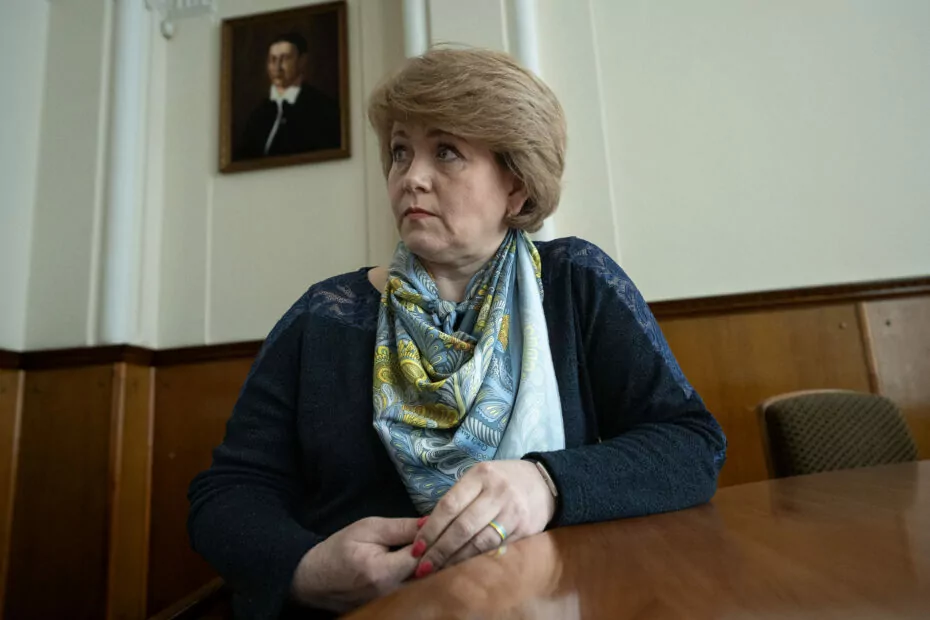
After the invasion, the situation changed somewhat. With whom I used to speak Russian at home, I consciously began to talk in Ukrainian. Even in everyday life, we began to switch to the language and the same with friends. On the street and in the city, I answer in Ukrainian — in pharmacies, coffee shops, etc. Although there were variations before, I could answer in Russian.
“This is my principled position, not as an authorized person, but as someone experiencing this war.”
On July 6, 2022, a Russian rocket destroyed one of the buildings of Skovoroda University. How did you feel when you found out about that?
We found out on the morning of [July – ed.] 6. One of my colleagues posted a photo in the work chat of our department. The fact is that the buildings of our and the neighboring pharmaceutical university are very similar in architecture. At first, we could not determine whether it was a hit on our facility.
But later, when other photos appeared, and it became clear that the building was ours, the horror began. Inside, everything was torn apart. We worked there for 20 years. We experienced a lot of emotions and events, pleasant and not so, in particular, related to the war. And when we saw those shots, the first thing that came was tears.
I got there for the first time on July 7 (they didn’t let us in on the 6, the emergency services were working). There was an awareness that these were not just walls. It is life. And now it is destroyed… It is tough to come to terms with it. Many still haven’t.
Did it affect your attitude toward the Russian language and culture? In general, to the country?
You know, I am an adult, and I understand one thing: if the “great Russian culture” did not influence those who talk about it to develop humanity, then it is not that great. Secondly, this greatness also applies to personal attitude. I also studied the works of Pushkin and Yesenin at school, and they did not turn me into a murderer, a tyrant who does not respect other cultures.
So far, I have crossed out any interest in Russian myself. I simply cannot organically perceive anything related to this culture.
Although I understand the time will come when it is necessary to look objectively at everything happening. The teacher’s profession requires objectivity, first of all, and only then – emotionality. But now I can’t help myself.
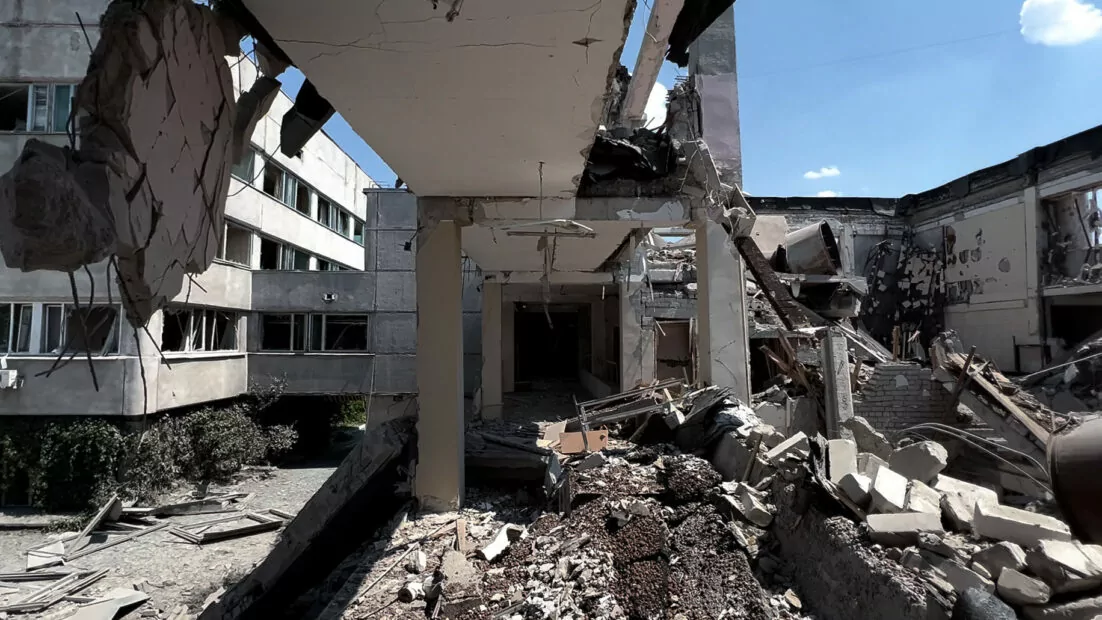
About language courses for employees
Volodymyr Borysov: Today, there is a need to help colleagues who do not speak Ukrainian fluently. That’s why we initiated courses specifically for employees: it is not only about scientific and pedagogical workers but also about technical personnel since the educational process is not limited to lectures and seminars.
Natalia Shcherbakova: Today, 33 employees are registered for the courses. We conduct preliminary surveys to adjust each group’s focus according to the goals the participants set for themselves. For some, it is an improvement in spelling. For example, a new spelling was adopted in 2019 [The new edition brought back to use some features of the Ukrainian orthography of 1928 (the so-called Orthography of Kharkiv), which were part of the Ukrainian orthographic tradition thrown out by the Ukrainian orthography of 1933, which began the Russification of the Ukrainian orthography tradition. – ed.]. It has the power of a document that should be relied on, but not everyone has time to process it to the required extent. Some people want to better adjust to professional communication because other languages prevail in their everyday life. Here, too, the help of specialists is needed.
People immediately responded to our courses. We took a balanced approach to this process — so that each group would move toward its goal and develop.
Volodymyr Borysov: We want the Ukrainian language to be present at the university, not only in lectures. As Natalia Volodymyrivna says, to correct, one must first help. Although, in my opinion, there is no immediate problem with this at the university. There are certain gaps that should be filled.
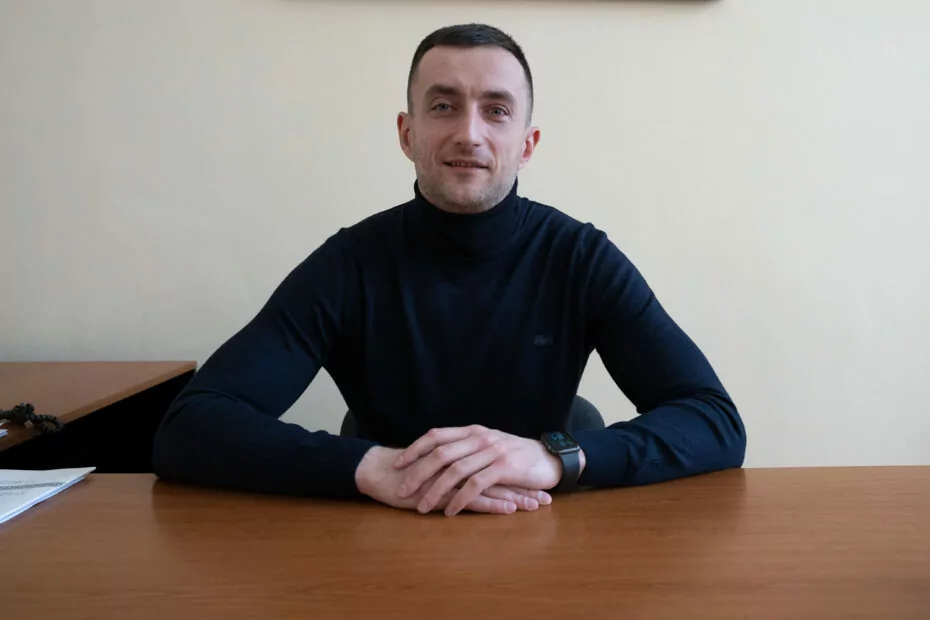
Read how the Ukrainian girl presented the University with a Japanese book about war
About gentle and strict Ukrainization
How do you feel about language bans like the one at the Kyiv-Mohyla Academy? The decision is somewhat radical. [In January 2023, the educational institution prohibited using the Russian language. – ed.]
Volodymyr Borisov: You got the impression that this is a radical decision related to a categorical ban. But this is just an accepted rule; the norms of language behavior within the university are more clearly stated in the internal procedure rules – that’s all. If this is the mode that regulates the cooperation of participants in the educational process, it is a standard work schedule. I will give an example. Today, universities work online: through correspondence, communication in chats, Viber, Telegram [social media used in Ukraine – ed.], etc. Let’s say a master’s student wrote theses, and I commented on them. In such cases, it is not yet a lecture but already a component of the educational process (which may also be regulated by certain rules).
Natalia Shcherbakova: Introducing the educational hub within our university was a good prospect. You know the specificity of our region: bilingualism. And in fact, we cannot claim that it was categorically imposed. No, as it turned out, we would not get anywhere from our neighbors. We are unsurprised that Lviv partly speaks or understands Polish and speaks Ukrainian. This neighborhood, with other states, is what it is.
Today, pushing people to switch to Ukrainian as soon as possible is necessary because it is a way to distance ourselves from aggressive neighbors. And speak to adequately position yourself in the world when you show your Ukrainian passport.
Counseling applicants preparing for the national multi-subject test is also the work of the educational hub. One of the bridges that show: contact us, we will help you, we have specialists.
I think, in the future, we should think about the question of whether to remove Russian-language sources from educational programs and recommended literature, especially scientific ones. Is it necessary to conduct an audit?
There was a comprehensive response to the decision of the Department of Ukrainian Literature of the Karazin National University, which they made public and asked the scientific community to react. Actually, they decided to take a balanced approach to this process. For example, they asked, should authors who wrote about Ukraine in Russian be prohibited when the Ukrainian lands were part of the Russian Empire and the Ukrainian language was banned? Or should we take them into account?
I think the next stage for the departments is to pay attention to the literature we recommend and update it. After all, new scientific discoveries are constantly brought to attention, and new influential translations appear.
“In one of the interviews, Kharkiv doctor Yevhen Olehovych Komarovskyi said, “Kharkiv perfectly demonstrated that pro-Russianness and Russian-speaking are completely different things.”
Obviously, we also have to show that not everything in Russian can be considered pro-Russian. It is necessary to pay attention to those periods when there was no writing in the Ukrainian literary language. So what now, forget this period? Was it a failure?
There is another nuance. I think we need to work so that the local population understands: we are not enemies just because we communicate in Russian. Many people who returned from the regions had a negative experience communicating with the locals. Drastic times: everything explodes and rushes. And it is clear what is associated with it: since trouble came from Russia, everyone who speaks Russian causes trouble.
Obviously, this will also have to be overcome. The way Kharkiv resists and recovers is a great example. Terekhov [Kharkiv Mayor – ed.] recently announced statistics: already today, about 1 million people live in the city. However, there were 400,000 at the beginning of the invasion. Why did people return? Because they believe. They know that there is life here.
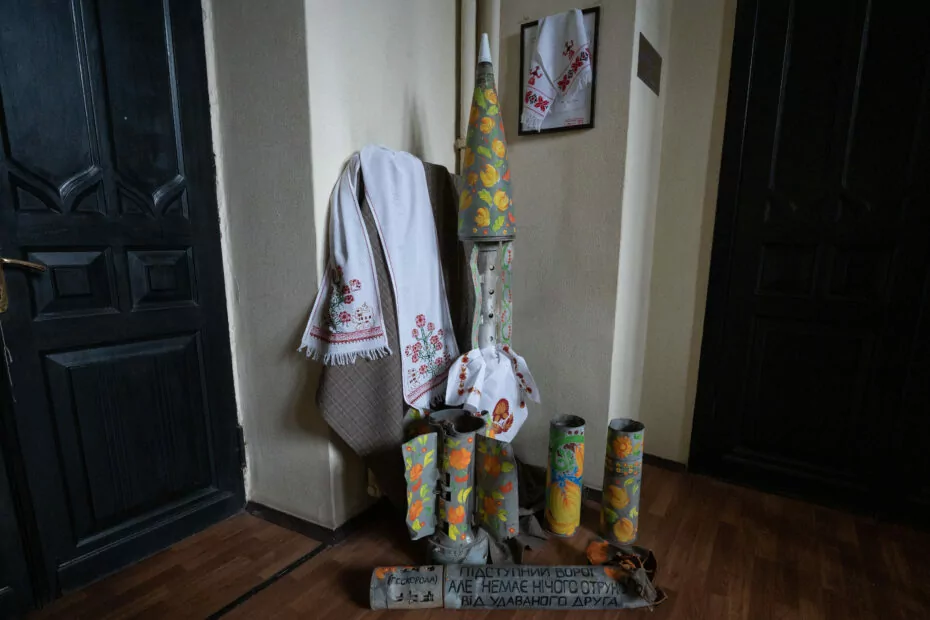
Join our Patreon to defend democracy in Ukraine together.
About the language ombudsman position
What were the prerequisites for appointing such a person?
Natalia Shcherbakova: This position is more for development than for control. In our institution, the language issue is not pending. Since I was a student and Ukraine was just gaining independence, our former rector Ivan Fyodorovych Prokopenko insisted on Ukrainian – many subjects were taught to us in Ukrainian. It was a conscious, purposeful policy — from when it became clear that the USSR was disintegrating, the independent state of Ukraine was gaining strength. And this should be reproduced in education.
Regarding the position itself and its organization – the concept of “language ombudsman” has existed in Ukraine for more than a year, and not since the beginning of the invasion of the Russian Federation. It has become an attribute of our existence since the issue of bilingualism and the creation of a regional language began to be actively raised. If you remember, some time ago, the case concerned the recognition of Russian as a regional or second-state language. I wonder: there were about 80 ethnic groups in Ukraine only, according to the 2001 census. After all, the Russians were not the largest group, and there were other ethnic groups somewhere on the same level as them. So why was the question only about Russia? No answer.
Also, recall: as soon as [in the political arena — ed.] serious arguments finished, the language issue began to play out. This was acting out and manipulating personal matters that caused the desire to end the manipulations. And not to give a reason to raise those emotions in the future.
Regarding our university – first of all, consider that we are, after all, the University of Slobozhanshchyna. We have nowhere to go from bilingualism in everyday life, on the streets, and in public communication. Another question is whether this regular communication is transposed to the workplace. For many, this was the cornerstone. After all, at work, we always try to communicate tolerantly and calmly so as not to interfere with each other’s coexistence within the lines of duties. At the same time, very often, people make friends at work and create friendly teams. Such a friendly regime blurs the line: here is work, and here is not. It became an indicator for supporters of radical ideas: if much Russian is spoken on the street, this can be transferred into communication at work.
In my opinion, people are also to blame. After all, civic consciousness should have been more developed. Examples that come up very often, like the phrase “kakayaraznitsa” [“it does not matter” in Russian became a phrase that is often used in language question arguments as a last resort – ed.], really become a trigger. Many people really did not understand: to distance yourself from all the strangers who wish you harm, you also need a language barrier.
“For many, everything was too blurred. People simply did not care what language they spoke and did not set boundaries. Many have asked why it matters if I am performing my duties professionally. But the war showed: it matters.”
How you speak affects how you are perceived. And in this Russian-Ukrainian war, the very first identifier is still language.
In this regard, our region receives a lot of attention. Unfortunately, stereotypes still have to be destroyed. Even though Kharkiv so categorically and firmly declared itself as a real outpost (remember the Ring Road and Northern Saltivka [parts of town heavily affected by the missile attacks – ed.]), we will still get a lot of complaints.
But what prompted the introduction of this position at your university?
Apparently, a combination of extra lingual factors is not strictly related to language development: the introduction of a new spelling, the need to draw up documents, provide consultations, etc.
It is good that the youth, particularly the Kharkiv students, have become much more conscious than before the war. People began to pay attention to their rights, particularly the right to receive public education. They [youth — ed.] absolutely consciously demonstrated to everyone: since this right exists, they will use it.
The precedent at the Karazin University (when students complained about teachers who did not observe the language regime) demonstrated: qualifications, knowledge of one’s material, and experience are not enough for you to teach. Obviously, the fact that you are a conscious representative of a state at war must be demonstrated primarily through language.
It is possible that an outsider who came to our university for a master’s thesis defense, not knowing the working policy, will speak Russian. But for this not to happen, there must be a language representative. I would not like to call myself a language ombudsman (because there is only one in the state – Taras Kremin [The State Language Protection Commissioner – ed.]); I am an authorized person on the functioning of the state language at Skovoroda University. I perform less of the control function as I help – that’s the first thing. It is how I, the department, and the management formulated it for me.
What exactly are your responsibilities now?
To be honest, the provision on the authorized person is still being revised by lawyers to ensure that it meets the requirements of the law and official duties. But above all, it is the protection of the Ukrainian language as the language of the educational process and educational and scientific communication in the institution. This advisory function is related to helping when you need to understand spelling, new rules, etc.
Well, and popularizing! Apparently, it was necessary to start with it. It is directly related to the work of the educational hub at the university. Hub is a very productive initiative: applicants who have already joined the multi-subject test preparation consultations are interested, and they see the level of our teachers. Hopefully, this will be a convincing argument to study.
Have students or employees already approached you as an authorized person?
They have not yet approached me, saying, “Natalia Volodymyrivna, we want to address you as an authorized person.” But when the idea to create Ukrainian language courses for employees appeared, believe me, people said, “Please help.” The question is not even that a new Shcherbakova ombudsman has appeared but that there is finally a person whose functions include assistance — and people came for it.
Students have not contacted me with complaints.
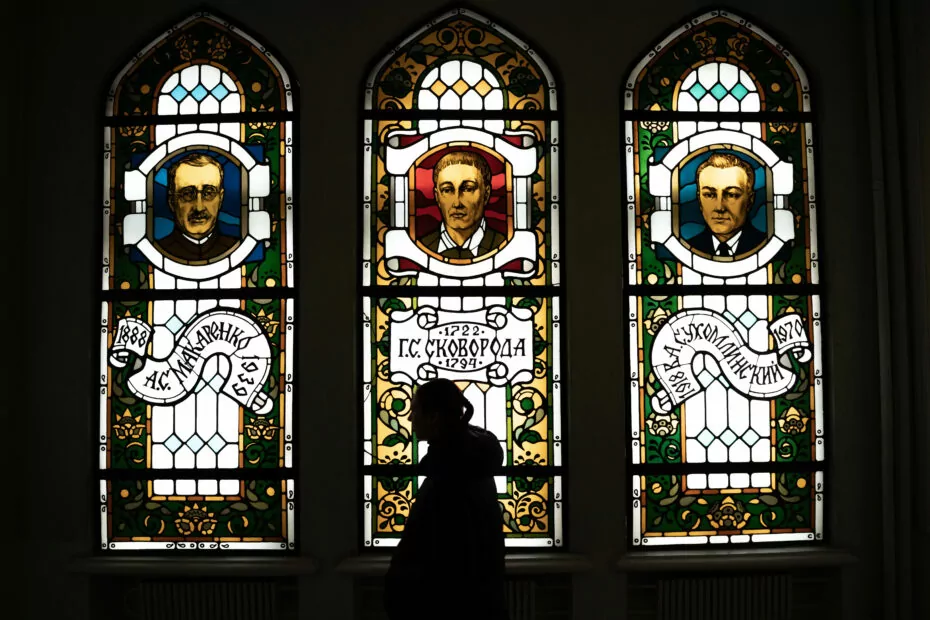
What is the most common language problem employees have?
All employees are adults. Everyone has children. As adults, they have trouble learning new things. Afraid to do something wrong. Knowing there will be mistakes in advance, this shyness to start doing is the biggest problem. Attempts to speak are often accompanied by apologies, corrections, and comments like “I’ll learn.”
For employees, the problem is rather psychological: to overcome the barrier and start talking. Although we convince everyone: you cannot speak the language well without being bad at first. We will help.
Now the university has an educational hub and courses. Are there any other initiatives?
Yes, this is something that already has a specific shape. In the future, we will discuss the function of consultation regarding revising and re-issuing documents accompanying the educational process.
For example, acute problems are associated with using scientific or methodical literature written in Russian. I mentioned above that this problem should be carefully approached because there were periods in the state’s history (such as its existence as part of the Russian Empire) when nothing was published in a language other than Russian. The ban was in effect. It is useless to look for any documents in Ukrainian.
I believe it is worth approaching this, as our colleagues from Karazin University suggested. They shared their vision on Facebook. In their opinion, the revision should first take place so that imperialism and the Russian narrative of “everything Ukrainian is inferior” are removed from the process.
“But we cannot and, in my opinion, should not completely ban reading books and sources in Russian. The first reason is the sources about Ukraine in Russian, and the second is that some things should be considered in a discussion mode, knowing a different position.”
Are employee courses created based on the needs of employees or the administration?
Employees.
Our educational institution returned to the educational process on April 1, 2022. Like everyone, we experienced despair and did not understand what would happen next. During the tough times of the bombing of Kharkiv, the employees went all over the country, and some went abroad. Forced migration makes you consider how adequately you represent your country and whether you are a fluent native speaker.
We know examples of people abroad with Ukrainian passports who started speaking Russian and felt a negative attitude. This experience led to the question of improving language skills. People started looking for help, including us.
Are there students or staff who do not know the language so well that it creates problems for the educational process?
We have international students. For them, any foreign language is a problem. Here, our specialists have experience in communication and training.
I would be a dreamer if I said: all the Chinese who came to study here learned Ukrainian from the first year. Certain moments must be discussed in more detail to work with them.
As for students who are Ukrainian citizens, the school program allows them to prepare.
Among the employees, we have colleagues of different ages. Many have overcome the problem of switching to the Ukrainian language in the work process a long time ago. But new information and sources appear simultaneously, so sometimes colleagues have a question, what is correct? It is also because today, a teacher is both an educator who works in the classroom and a scientist. This component is mandatory. Scientific communication also has its norms.
At the same time, language is dynamic. It changes. I agree that it may be challenging for a specialist who does not know the language to feel and process the changes immediately. Earlier, people would come to us simply as colleagues, saying, “Linguists, help,” but now it takes the form of communication at courses.
When our colleagues filled out the questionnaire, they indicated various reasons they wanted to attend the courses. One of the reasons is to improve your knowledge when you already use the language.
And what other reasons were there?
New spelling. We are becoming familiar with it.
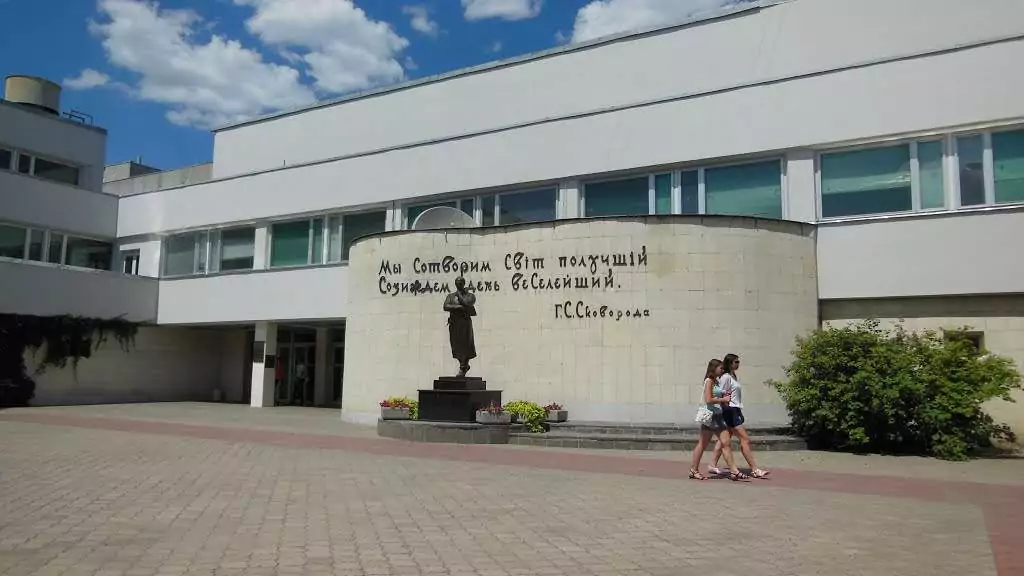
In your opinion, is there discrimination based on language at the university? Any language?
No. Definitely not. Any discrimination is a sign of disrespect, and we don’t have that in professional communication.
In your opinion, is it essential to maintain the diversity of languages in the university?
Any diversity should be supported, but at the same time, remember one thing: diversity allows you to develop and know more, not less. Ancient Jews used to say, “The number of languages you know, so many times you are a person.”
At the same time, some laws regulate our coexistence. Suppose we follow the rules and know, for example, that there is the 10th article of the Constitution, which protects the existence of Ukrainian as the titular language of the nation in all spheres. Nothing will prevent other languages and cultures from coexisting harmoniously in that case.
You have already mentioned the problem of textbooks in Russian. Have you come across it in your institution? I know it can happen when there are many different departments and programs.
We have a wide selection of specialties and many programs. I talk more about language and history because I am a Ukrainian language teacher. Regarding colleagues, I know that there is a problem.
First of all, even in our country, until recently, there was a Russian language program studied by citizens of Ukraine and many foreigners. For example, the Russian language was in demand in Turkmenistan – we had representatives from this country. There were also many students from China. Of course, they used textbooks written in the Russian language or even in Russia.
Regarding technical specialties, I do not rule out that textbooks were also written in Russian. Another matter is how actively to recommend them for familiarization now and exactly how? If a full-fledged book written in Ukrainian meets all the requirements from the profession’s point of view and subject, then why prioritize the Russian source? There is no need. I think that colleagues abandoned such practice long ago.
However, when it is necessary to consider some debatable point, it is probably possible to turn to such a source. A mandatory scientific commentary is required here, and only under this condition can one refer to such literature.
And what is happening with Russian language programs today? Is recruitment ongoing?
We cannot remove programs recommended for admission at once. There is a whole approval procedure.
“Last year, these programs were presented to applicants, but they voted for themselves. They simply did not come to them.”
Apparently, the full-scale invasion was one of those triggers that showed they had to be removed. No one is interested in them anymore. No one believes in good neighborly relations.
How do you feel about the complete decommunization and even decolonization of Kharkiv? Changes of toponyms, demolition of monuments, writing off Russian books.
Difficult question. Not because I am against decommunization. On the contrary, I think it should have been done 30 years ago. But we understand that any monument is someone’s work, someone’s point of view. And if we did not have such a bitter experience, perhaps the perception would be different.
For example, you know that monuments in Kharkiv were removed at night. I think, why at night? What is the crime? In some cases, commemorative plaques to Yurii Shevelyov were vandalized – or to Holodomor victims and UPA soldiers. There is the same question: why are you fighting with monuments?
I think it should be done. It’s not precisely civilized that the monuments just collapse. But it was a good idea to start work earlier — clean the streets and create, for example, a park of the Soviet period. It would be appropriate to show who these figures were and how they influenced Ukraine as a state.
Nevertheless, if you ask me as a person, not an educator, I will answer simply: it must be removed and renamed.
What fate will befall the Skovoroda monument? [The monument near the ruined university building – ed.] Will it be installed near your buildings? Will it wait for the end of the war?
Indeed, I would like it to be there already. We still sometimes come to that building. We hope that the building, part of which is destroyed from the third to the first floor, will be restored and it will return to its place, just like Skovoroda [known as a traveling philosopher – ed.].
How do you feel about the policy of radical Ukrainization in all spheres?
Cautious. I emphasize my position is like this: there will be no need for radical Ukrainization if people obey existing laws. There is a law that civil servants must speak the Ukrainian language, so they must.
Today, I can understand supporters of radical Ukrainization because the non-radical one did not work correctly. But I also understand people who find themselves in circumstances where they are unfairly perceived as not proper citizens, not conscious ones.
It’s like in a situation with a broken boat: you can look for the one who made a mistake or save yourselves together. I choose the second variant.
by Polina Kulish,
translated by Alisa Yarova,
edited by Tetiana Fram
